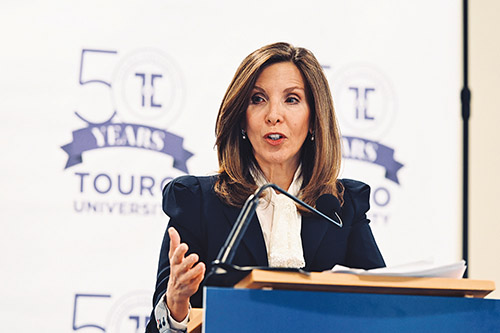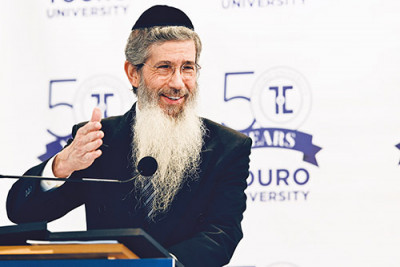
(Courtesy of Touro University) As part of the year-long celebration of its 50th anniversary, Touro University is focusing on the future as well as the past. A special anniversary conference held at Touro’s Lander College for Men highlighted this viewpoint. “Perspectives on Individual Autonomy and Community Responsibility” explored the legal, ethical, and halachic issues related to the individual’s right to make decisions. The conference was chaired by Dr. Stanley Boylan, Touro vice president of undergraduate education and dean of faculties, and Dr. John Loike, professor of biology and interim director of bioethics at Touro’s New York Medical College.
The medical ethics conference brought together experts in medicine, psychology and Jewish law to discuss current issues including parental authority and yeshivas as related to vaccines, support versus stigma for those with special needs and the potential impact of legalization of marijuana.
“Touro is committed to preserving and perpetuating the Jewish community. This conference is one example of that commitment, as it links Jewish tradition and halacha with societal issues,” said Dr. Alan Kadish, president of the university.

Dr. Kadish offered an example of the intersection between biomedical ethics and halacha. “We need to balance individual preservation with community responsibility,” he said. “Jewish tradition includes a strong sense of community responsibility, including a commitment to caring for those in need. However, it is easy to imagine a situation in which a therapy or vaccine creates some risk to the individual but offers larger benefit to the community. How do we balance that?” he asked.
Individual Authority, Community Responsibility and Halacha
Rav Yonason Sacks, shlita, rosh hayeshiva, Beis Medrash L’Talmud, Lander College for Men, also discussed balancing risk. “Your body, your soul does not belong to you. You are its guardian. Every decision of spiritual and physical well-being must be framed by recognition of this,” he said. He referenced the need for a careful response to the pandemic as an example. Dr. David Katz, a professor at Touro College of Dental Medicine, raised a similar topic when he discussed parental authority, yeshivas and the measles vaccine. Additional speakers on the topic of individual autonomy, community responsibility and halacha included Rabbi Dr. Avraham Steinberg, a professor of medical ethics at Hebrew University and editor of Encyclopedia Talmudit, who addressed the roles of patient autonomy when it conflicted with halacha. Rabbi Tzvi Flaum, professor and mashgiach ruchani at Touro’s Lander College for Women, presented on the role played by patient autonomy in the use of experimental drugs in halacha.
The Impact of Legalizing Marijuana
Legalization of marijuana is another hot-button issue that requires a careful response. To date, 18 states and Washington, DC, have legalized marijuana, and 38 states have legalized medical marijuana. This means that most Americans have access to cannabis, either medically or recreationally. According to Naomi Klapper, a psychotherapist and professor of psychology at Touro’s Lander College for Women, there has been an across-the-board uptick in marijuana use, including in the frum community. “Legalization has destigmatized marijuana. People think it must not be dangerous,” she explained “although the risk for abuse remains high.”
As people deal with COVID-related stress, more are using marijuana to relieve anxiety. In the moment, it seems like a “quick fix”—easier, cheaper and more accessible than therapy and prescription anti-anxiety medicines. However, the quick fix can easily become a long-term problem, according to Klapper. “Marijuana leaves you with a heightened sense of anxiety. Chronic users don’t develop coping skills,” she said. “People who become reliant lose motivation. They become emotionally removed. They pull away from social connections.”
The frum community needs to address this topic directly so that young people have the knowledge and decision-making skills they need to avoid addiction. Rabbi Dovid Goldwasser, a Judaic studies professor at Touro’s Lander College for Women, issued a call to action. He told attendees that everyone in the community shares responsibility and ownership of the problem. “Young people want to know. It is up to us to talk about marijuana, to talk about alcohol, to talk about everything that may draw a person toward addiction,” he said.
Dr. Zvi Loewy, professor and associate dean of research at Touro’s College of Pharmacy, shared his research on medical use of cannabis derivatives. Dr Yardaena Osband, a professor at Touro’s New York Medical College, provided insights from a medical perspective on the effects and usage of marijuana, particularly within the Jewish community.
Responsibility to People With Disabilities
The Jewish community’s responsibility to people with disabilities was the final topic of the day. Samuel Levine, a professor at Touro Law Center, addressed the issue, while Professors Faye Walkenfeld and Meira Orentlicher discussed the ways in which Jewish communities offer support for individuals, but need to make further efforts to avoid stigma in the process.
“Rooted in Jewish tradition, and built on Judaic values, Touro puts its mission—to educate, to serve, to enrich humankind—into practice every single day. This conference is part of a university-wide initiative to mark our 50th year through cutting-edge service and education,” said
Dr. Kadish.













